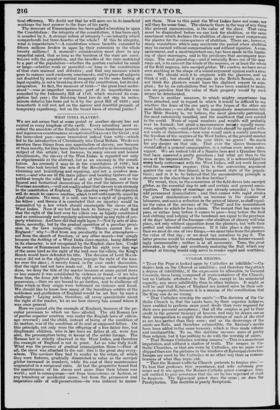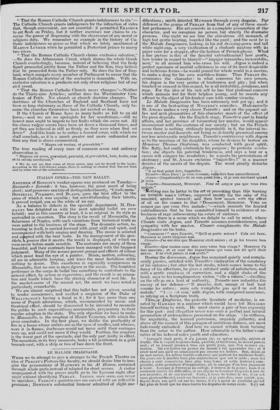VULGAR ERRORS.
"THAT the Pope is looked upon by Catholics as infallible."—Ca- tholics look on the Church as infallible ; and therefore they attach a degree of infallibility, if the expression be allowable, to General Councils, these being composed of representatives of the Church; but no Catholic attributes to the Pope, except in his ministerial capacity, any more infallibility than to other bishops. It might as well be said that Kings of England are looked upon by their sub- jects as impeccable, because it is a maxim of the constitution that the King can do no wrong. "That Catholics worship the saints."—The doctrine of the Ca- tholic Church is, that the saints have, by their superior holiness, been enabled to perform more good deeds than were required for their own personal acceptance; that all the surplus is put to their credit in the general treasury o heaven, and may be drawn out on their interposition to supply the shortcomings of such of the elect as are less-perfect than they were ; and as the deservings of the saints are finite, and therefore exhaustible, the Saviour's merits have been added to the same treasury, which is thus made infinite and inexhaustible. To us, this doctrine savours more of ppoetryoet than religion, but it has nothing to do with the worship of saints. "That Roman Catholics worship images."—This is a monstrous imputation, and without a shadow of truth. The images in Cp.- tholic Churches, or that are worn by Catholics, are no more wor- shipped than are the pictures in the windows of Episcopal churches. Images are used by the Catholics in no other way than as remem- brances of what they repre-ent. "That the Roman Catholic Church pretends to forgive sins.— To him that professes true repentance, and who solemnly pro- mises not to sin again, the Roman Catholic priest conceives him- self entitled to give assurance that the sin he has repented of shall be forgiven. The Episcopal priest does the same ; so does the Presbyterian. The doctrine is purely Scriptural. "That the Roman Catholic. Church grants indulgences to sin."— The Catholic Church grants indulgences for the infraction of rules that, though convenient, are not essential : it permitted ERASMUS to eat flesh on Friday, but it neither exercises nor claims to ex- ercise the power of dispensing with the observance of any moral or religious duty. We remember no example in the history of Ca- tholic indulgences so grave as that which we lately mentioned of MARTIN LUTHER when he permitted a Protestant prince to marry two wives.
"That the Roman Catholic Church claims exclusive salvation." —So does the Athanasian Creed, which damns the whole Greek Church everlastingly, because, instead of believing that the holy Spirit proceeded jointly from the Father and the Son, they believe that he proceeded from the Father only. So does the law of Eng- land, which compels every member of Parliament to swear that the Roman Catholic doctrine of the eucharist is damnable. With us, exclusive salvation is a predicate not only of our religious but of our civil creed.
"That the Roman Catholic Church never changes."—Neither do the Thirty-nine Articles ; neither does the Westminster Con- fession of Faith. No church or church doctrine changes. The doctrines of the Churches of England and Scotland have not been so long stationary as those of the Catholic Church, only be- cause the churches themselves have not existed so long.
If the Church of Rome have as 'many faults as fall to an old horse,—and we are no apologists for her wanderings,—still no honest man ought to impute to her faults which she owns not. All the above vulgar errors have been set down a thousand times, and yet they are believed in still as firmly as they were when first set down.* And this leads us to notice a learned error, with which we shall conclude, as it is a much greater and more unfounded one • than any that is above enumerated.
" Magna est veritas, et prmvalebit."
The true reading of every man of common sense and ordinary observation is
"Magnus est erro4 prmvaluit, prxvalet, et pralvalebit, hen, hodie, eras et in secula seculorum."
* We do not say that some of these errors may not be found in the books. According to the well-known adage, there is nothing so absurd that has not been said by some one of the schoolmen.



















 Previous page
Previous page